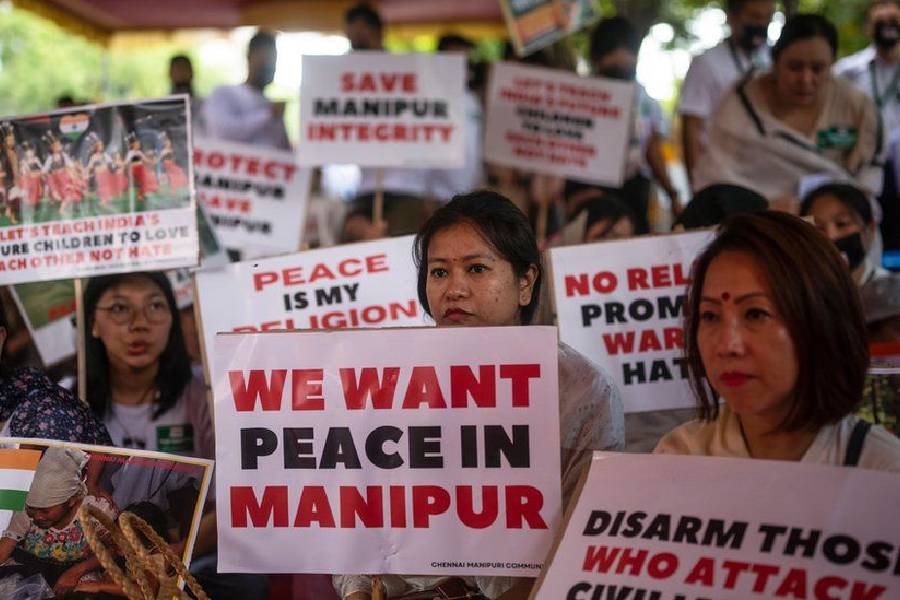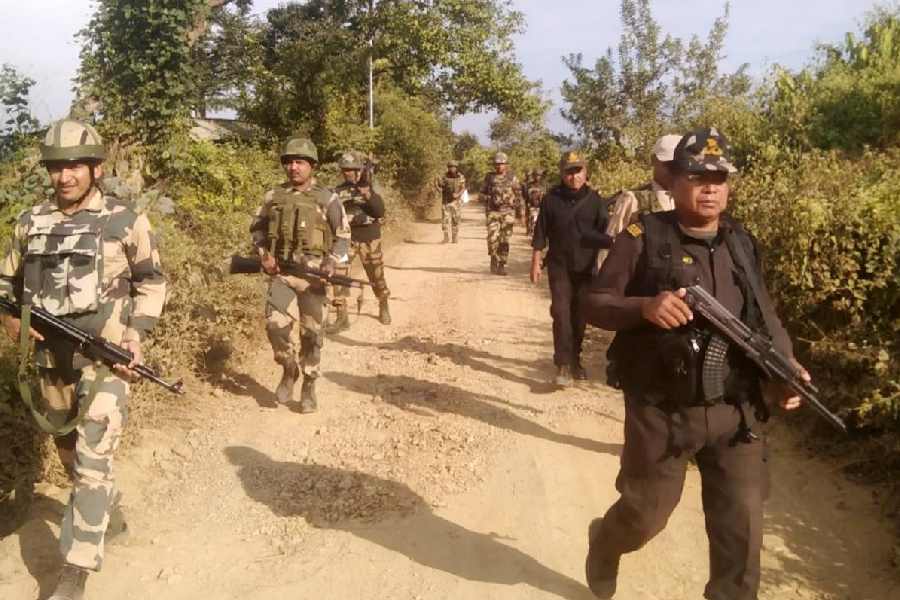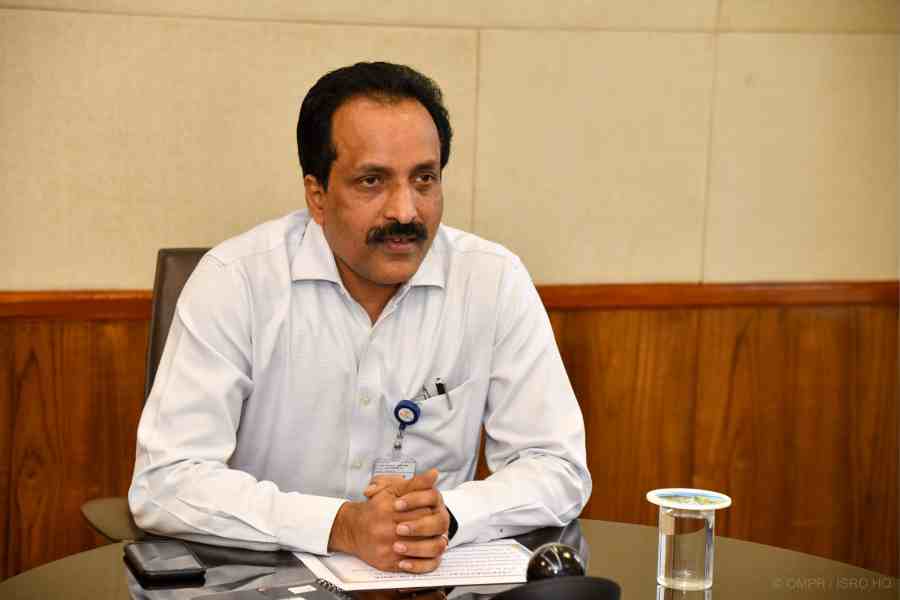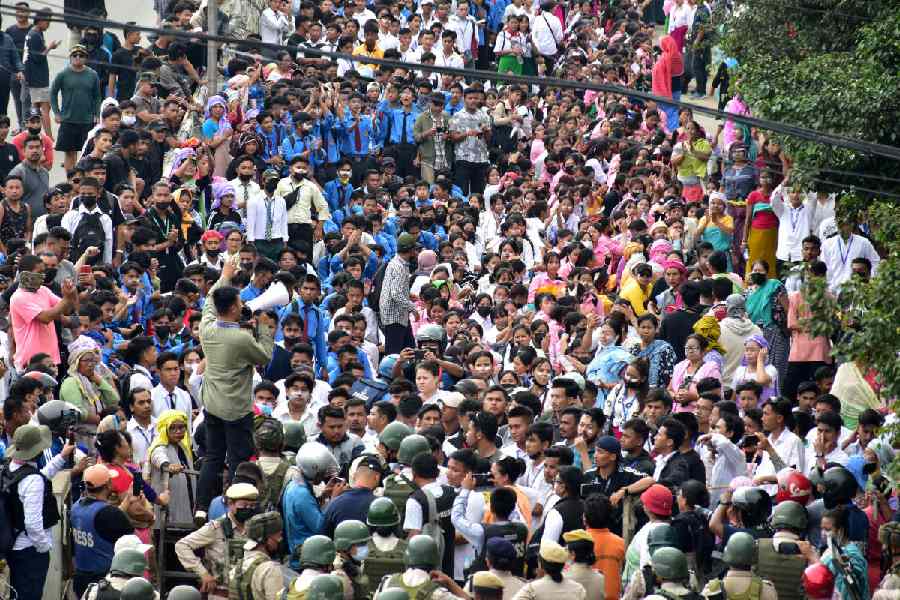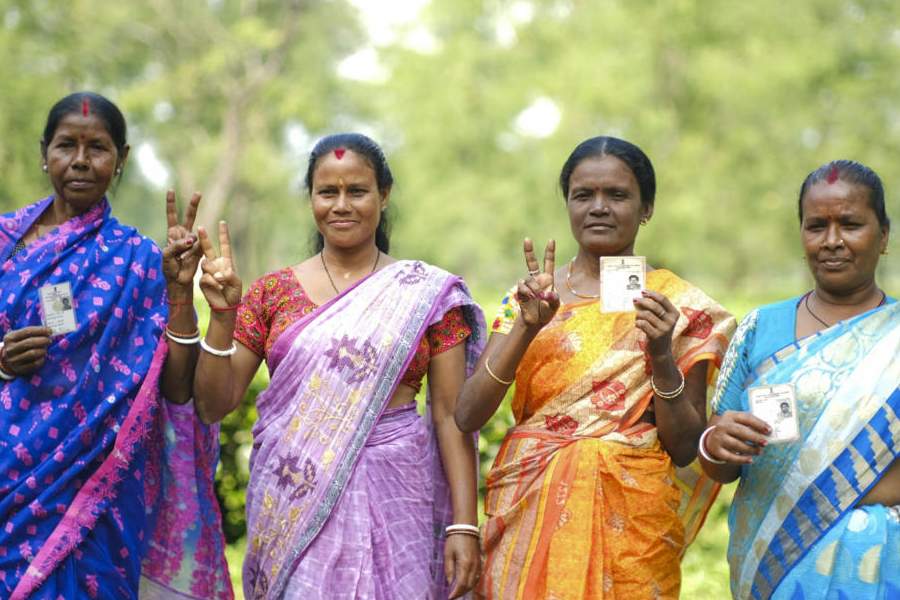Kuki-Zo organisations have expressed concern over Imphal valley-based MLAs and MPs taking an oath to protect the integrity of strife-torn Manipur at a meeting convened by the Arambai Tenggol, a Meitei socio-cultural organisation.
Kuki-Zo organisations have long accused the Arambai Tenggol of carrying out attacks on their community during the ethnic strife that began in the state on May 3 and is still continuing.
The Kuki Inpi Manipur, the apex body of Kuki tribes, referred to the oath-taking ceremony, held inside the Kangla Fort in Imphal, to condemn the "demise and subsequent burial of democracy in the heart of Imphal city".
The organisation found it "alarming" that the state government had “openly” accorded “state patronage to non-state actors, namely the Arambai Tenggol”. It alleged that “all Meitei-elected representatives (had) succumbed” to the diktat of the outfit.
The Kuki Inpi reiterated that having separate administrations for the largely valley-based Meiteis and mostly hill-based Kuki-Zo was the only means “for our survival, as we can no longer coexist with a community that... (is) hell-bent on wiping out the Kuki-Zo people”.
Police said the Arambai Tenggol had “summoned” the MLAs and MPs to the meeting, held at 10am on Wednesday. It was called to discuss the worsening of law and order over the past month, during which 26 Meiteis were allegedly “killed by Kuki-Zo militants”, and to take steps to protect the state’s integrity.
Other Kuki-Zo groups expressed sentiments similar to the Kuki Inpi’s.
On Wednesday, the Churachandpur-based Kuki-Zo organisation, the Indigenous Tribal Leaders’ Forum (ITLF), had castigated the Kangla meeting. It posted on X that “never before we have seen” MLAs and ministers “cower before a radicalised insurgent group in the heart of Imphal”.
An ITLF statement said the oath-taking took place “right under the watchful eyes” of the Union home ministry officials who had arrived a few days earlier and met the “insurgent group”.
The Committee on Tribal Unity, another leading Kuki-Zo organisation, on Wednesday questioned the “rationality” of the three-member home ministry team meeting “the majoritarian Meitei community”, including the Arambai Tenggol, on Tuesday.
It said the “restoration of normalcy” could be achieved only if the Centre “first ban(s) the Arambai Tenggols” and other “illegal” armed outfits, imposes the Armed Forces (Special Powers) Act on the 19 valley police stations currently exempted from its ambit, and ultimately “recognise the physical and geographical separation between the Kuki-Zo and the Meiteis”.
The Kangla meeting is being seen as a response to the demand from Kuki-Zo organisations and the state’s 10 Kuki-Zo MLAs for a separate administration for the community, or a separation from Manipur.
The Kuki-Zo contend there is already an unofficial separation of populations: the Kuki-Zo cannot travel to the valley, nor can Meiteis to the hill districts.
The valley is home to 40 MLAs while the hill districts, where the Kuki-Zo and the Nagas are the leading tribes, have 20 MLAs.
Reports suggested that 36 Meitei MLAs and two MPs took a collective oath “administered” by the Arambai Tenggol to safeguard the integrity of the state.
Later, the Arambai Tenggol chief told a public meeting that the Meitei MLAs and MPs had endorsed the organisation’s six demands.
These include the scrapping of the Suspension of Operations pact between Kuki-Zo militants and the Centre, implementation of the National Register of Citizens with 1951 as the cut-off year, removing the Assam Rifles from Manipur, fencing the Myanmar border to check influx, and delisting illegal Kuki immigrants from the Scheduled Tribe list.
The Arambai Tenggol said the lawmakers had promised they would take steps on these demands within 15 days or else would join the people’s movement in support of these demands.
While Kuki-Zo organisations have spoken against the Kangla development, the non-government Meitei Alliance said in a statement on Thursday that it “endorsed” the Kangla resolutions signed by the MLAs and MPs who attended the meeting.
It lauded the choice of the Kangla Fort as venue, saying it was the centre of power of indigenous governance, which had ceased since the British invasion of 1891. The princely Manipur state merged with the Indian Union on September 21, 1949.
“Second, the joint congregation of the elected representatives across parties and Arambai Tenggol leaders, and the support shown by various other organisations is an unprecedented event marked by placing patriotism, nationalism, and collective will above all other loyalties,” it said.
“Third, the contents of the resolutions exemplify a higher level of political maturity and commitment to address the common grievances of the indigenous people of Manipur. Meitei Alliance strongly feels that the above demands are timely, lawful, and democratic.”
The ongoing strife has left at least 204 people dead and displaced over 67,000.

